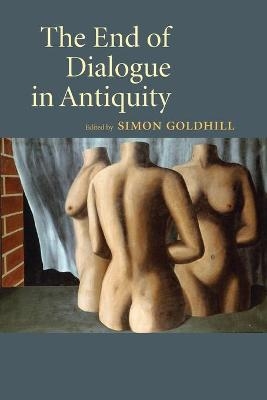
The End of Dialogue in Antiquity
Cambridge University Press (Verlag)
978-1-108-82384-5 (ISBN)
'Dialogue' was invented as a written form in democratic Athens and made a celebrated and popular literary and philosophical style by Plato. Yet it almost completely disappeared in the Christian empire of late antiquity. This book, a general and systematic study of the genre in antiquity, asks: who wrote dialogues and why? Why did dialogue no longer attract writers in the later period in the same way? Investigating dialogue goes to the heart of the central issues of power, authority, openness and playfulness in changing cultural contexts. This book analyses the relationship between literary form and cultural authority in a new and exciting way, and encourages closer reflection about the purpose of dialogue in its wider social, cultural and religious contexts in today's world.
Simon Goldhill is Professor of Greek at the University of Cambridge and a Fellow of King's College. He has published widely on many aspects of Greek literature, including Reading Greek Tragedy (1986), Foucault's Virginity (1995), Who Needs Greek? (2002), and How to Stage Greek Tragedy Today (2007). He is in demand as a lecturer all over the world and is a regular broadcaster on radio and television.
Introduction: why don't Christians do dialogue? Simon Goldhill; Part I. Classical Models: 1. Fictions of dialogue in Thucydides Emily Greenwood; 2. The beginnings of dialogue: Socratic discourses and fourth-century prose Andrew Ford; 3. Plato's dialogues and a common rationale for dialogue form Alex Long; Part II. Empire Models: 4. Ciceronian dialogue Malcolm Schofield; 5. Sympotic dialogue in the first to fifth centuries CE Jason König; Part III. Christianity and the Theological Imperative: 6. Can we talk? Augustine and the possibility of dialogue Gillian Clark; 7. Let's (not) talk about it: Augustine and the control of epistolary dialogue Richard Miles; Part IV. Christianity and the Social: 8. Christians, dialogue and patterns of sociability in late antiquity Richard Lim; 9. Boethius, Gregory the Great and the Christian 'afterlife' of Classical dialogue Kate Cooper and Matthew Dal Santo; Part V. Judaism and the Limits of Dialogue: 10. No dialogue at the symposium? Conviviality in Ben Sira and the Palestinian Talmud Seth Schwartz; 11. Dialectic and divination in the Talmud Daniel Boyarin.
| Erscheinungsdatum | 24.08.2020 |
|---|---|
| Zusatzinfo | Worked examples or Exercises |
| Verlagsort | Cambridge |
| Sprache | englisch |
| Maße | 151 x 230 mm |
| Gewicht | 410 g |
| Themenwelt | Geschichte ► Allgemeine Geschichte ► Vor- und Frühgeschichte |
| Geschichte ► Allgemeine Geschichte ► Altertum / Antike | |
| Geschichte ► Teilgebiete der Geschichte ► Religionsgeschichte | |
| Religion / Theologie ► Christentum ► Kirchengeschichte | |
| ISBN-10 | 1-108-82384-X / 110882384X |
| ISBN-13 | 978-1-108-82384-5 / 9781108823845 |
| Zustand | Neuware |
| Haben Sie eine Frage zum Produkt? |
aus dem Bereich


